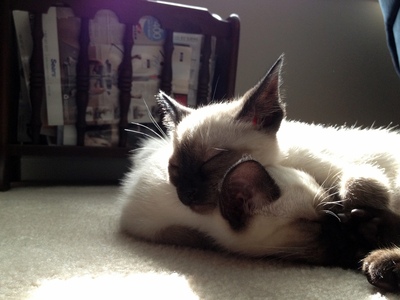As far as I know I'm not unhealthy. I don't really have any complaints about how I feel physically day-to-day. However over the past few years I've started to notice that I am aging and that some things are not the same as when I was 20. Simultaneously, many of my friends have been pursuing various alternative approaches to diet and exercise. As a result I became much more mindful of my own choices. I did not make any changes, but for the last couple years I have been making the effort to think about each thing I eat and how much time I spend being active.
The Internet is full of competing theories on how best to eat and exercise. My conclusion is that as a species we haven't figured it out yet. Sure there are recommendations from various government bodies but the more you research the more it seems that "best" is really much more personal than a generic food guide can cover. The key is most likely listening to your own body and adjusting your choices to achieve optimal levels of fitness and well-being.
A few months ago I set myself a goal in the realm of health. I want to live a long life with minimum illness in a body that not only can I rely on to perform well physically, but that I will enjoy using in physical settings. I want to be able to be joyfully active. I also set a corollary to that goal: I do not want to allow the goal to limit my experiences. I shouldn't avoid trying something once or twice just because it conflicts with maximizing long life. The pursuit of good health should be a default setting, but exceptions should be allowed without fuss. Living long is pointless if you don't do anything with that life.
With that in mind I have been making small alterations to my diet and exercise over the last couple months. I want to emphasize that these changes are not meant to be temporary. I'm changing my life style, not going on a diet. If I find some changes don't work or produce negative results I'll adjust as I go but the idea is to zero in on the optimal configuration.
First, I have defined processed/refined sugar to be an exception to my default setting (this includes disgusting artificial sweeteners, but I didn't eat those anyway because of the disgustingness). In an average day I no longer eat any at all. If I need to sweeten something I use maple syrup or honey, but I do that very rarely.
One of the interesting side-effects of this is that I had to eliminate almost all processed food because so much contains sugar. I now make my own salad dressings and sauces and lots of other stuff. The other interesting side-effect is that when I do make an exception and indulge in some tasty baked good I often find I want less of that item or I find it too sweet altogether and want none. I'm also finding fruit to be more delicious than it was before. I am thoroughly convinced that the spread of cheap accessible sugar is the cause of most of society's obesity woes.
My biggest exception sugar-wise is chocolate. I eat dark chocolate quite regularly but if a bar is marked as 75% cocoa, that means the other 25% is mostly sugar. 85% is my default darkness and I rarely eat more than a couple squares at a time so I don't think that is too bad. I've also found a couple 100% bars (no sugar at all) that aren't too bad for straight eating however I still prefer the 85%.
The next change I've made diet-wise is concerning meat and fish. I suspect the only way I'll stop eating meat is if the world runs out of it or if my doctor can convince me that it is hurting me significantly. I'm not a raging carnivore or anything. It's not unusual for me to go for a day or two with no meat at all. So I have decided that when I do eat meat, I want to eat good meat and I'm willing to pay a premium for it.
When I was younger my dad had a little hobby farm and he had a bunch of chickens. He fed them normal feed and they had a pen to sleep in, but for the most part they ran around the yard pecking at grass and bugs and doing whatever came naturally to them. Those chickens produced the best eggs (thick hard shells with violently yellow yolks) I've ever had. Similarly, the ones he butchered produced the best tasting chicken I've ever eaten (super moist and extremely flavourful, even in the white meat).
Factory farming is very different. Chickens sit in cages their entire life and are fed whatever the companies find fattens them up the quickest. They are injected with hormones and antibiotics whether they need them or not. Same with cows and pigs (and even fish that is farmed). These practices have made meat cheaper than ever which makes meat more accessible to all of society. However it's pretty easy to see and taste the difference. Additionally, most research I've seen suggests that the meat from pastured animals that are allowed to act like they would if left to their own devices (grazing, rooting, pecking, walking around, etc.) has a much better nutrient profile than factory farmed meat. For example, grass-fed beef has a much better ratio of omega-3 and omega-6 fatty acids (more omega-3 good, too much omega-6 bad) than beef from cows fed with corn (cows aren't supposed to eat corn).
My take on this is not one of animal welfare. I am all for prosecuting people who are cruel to animals, but it would be hypocritical of me to suggest that it is better to eat a happy pastured cow than an unhappy factory-farmed cow. I'm still eating the cow. My point here is that pastured animals taste better and science suggests they are better for you. So that's what I try to eat when I eat meat (or eggs) now. There are some great farms near Toronto that will deliver frozen, pastured meat to the city and what I've had so far has been delicious.
Next up on diet improvement has been to increase my fresh fruit and vegetable intake (note that despite various food guides, corn and potatoes are not vegetables, they are lumps of starch). This one was a no-brainer, every single diet recommends more fresh produce. I try to buy most of my produce from local markets now. Many people complain that the farmer's markets are expensive but I find if you buy the stuff that is actually in season it can be quite cheap. So right now squashes and apples and a few others are very cheap. Earlier in the summer you could buy bushels of tomatoes and peppers for almost nothing. I have been roasting and freezing the extras for eating over the winter and anything roasted is awesome.
(A quick aside here...I made the best peaches ever this summer. Take a bunch of peaches, quarter them and remove the pits. Place them on a parchment lined baking sheet, skin down. Put a small dab of the best real butter you can buy on each quarter. Sprinkle them all with coarse salt and a bit of freshly squeezed lemon juice. Roast in a 400F oven until they look delicious. Eat them hot or cold and freeze the extras. Mix them with things like yogurt. Pure bliss.)
The biggest change to my diet is that I have greatly reduced my intake of wheat. This one is an experiment. Several of my friends have cut out wheat and I wanted to see what it would be like. To start with, I stopped eating cereal or bagels in the morning. I made this change over a year ago. Now I generally eat a bowl of berries mixed with plain greek yogurt and a small handful of almonds and hazelnuts. It's delicious and I found that I don't get hungry again until about 12:30pm. With cereal, I'd sometimes be hungry by 10:00am.
That seemed like a conclusive win and pushed me to try to cut out my daily sandwich at lunch. I haven't had a sandwich for lunch for about a month now. Instead I bring leftovers from supper or I make wraps with veggies, meat and cheese out of big leafy greens like kale or collards or swiss chard. It takes a bit more planning, but now I don't slip into a low-grade coma around 3pm. I still have an apple as a snack around that time, but I don't actually feel like I need it anymore. I'll still keep eating them though because apples are yummy.
For supper I now avoid pasta and if I do really want pasta I'll occasionally grab a bag of rice or lentil noodles. And as for tasty baked goods...well they're loaded with sugar so I was avoiding them anyway.
Again I'll still happily consume wheat as an exception, but it seems like a good default setting to avoid it.
The last big change is that I've stopped thinking about fat at all (other than avoiding highly processed artificial fats like margarine or trans-fatty things). Low-fat versions of foods often have added sugar or random chemicals to keep an acceptable taste. So it's really just trading one questionably bad thing for some other definitely bad things.
The idea that saturated fat is bad for your heart is coming under fire lately, mostly from the paleo/primal lifestyle camp. It was originally based on rather poor research from the fifties by Ancel Keys which found among seven countries that more saturated fat led to more heart disease. But it turns out he ignored data from fifteen other countries that pretty much destroys the fancy graph he drew (some countries had low-saturated fat intake and high heart disease and others had high intake and low disease). Somehow this bad research became the foundation of modern diet recommendations. My understanding is that this happened despite inconclusive follow-up research that tried to do controlled tests on the relationship between heart disease and saturated fat intake. At the same time as Keys was working on this, other researchers found similar and more pronounced connections between dietary sugar and heart disease but for whatever reason society decided that saturated fat was the bigger evil.
Anyway, my conclusion from what I've read is that we don't really know whether saturated fat is as bad as they say. However the human body actually needs some saturated fat. When you diet and lose fat weight, that is your body consuming your own saturated fat as energy. It's good at it. If you eat saturated fat instead your body consumes it the same way. It's a good source of energy. Saturated fat from animals is also a good source of fat soluble vitamins like K2, A and D. The human species has been eating saturated fat forever (and some societies like the Inuit eat a ridiculous amount of it with no ill effects). Heart disease is a recent epidemic that seems to match more closely with the rise in sugar consumption. So I'm going to enjoy my nuts, avocado, butter, cheese, bacon and other meats (from pastured animals when possible) while being sure to have regular blood work from my doctor to monitor my heart health.
To sum up my new approach to food: Eat lots of fresh produce. Avoid sugar and wheat. Don't worry about (unprocessed) fats. Eat meat from pastured animals. Don't eat processed foods. These are default settings that may be overridden for deriving maximum enjoyment of life, particularly in social situations (alcohol is a fantastic exception).
That's enough about diet, now on to exercise. I mentioned recently how I found a month of regular running really changed my fitness level and how I might keep it up. Well that didn't happen because I find running to be terrible. Instead I'm continuing to push myself to climb twice a week and in between I focus on body-weight exercises.
I'm a bit allergic to gym equipment. I find it strange that we should need special objects to be in shape. So instead I use my own body. I do about fifteen minutes of repeated sets of push-ups, deep squats, planks and chin-ups whenever I feel like it. I don't have a regimented schedule but I try to do it a few times a week. I've noticed increases in strength when climbing. Since my goal is to be able to enjoy using my body (and for me climbing is the ultimate expression of that) I'd say this is a successful strategy.
The other thing I do is walk a lot. I've always done that since living in Toronto but now that I'm so close to work I need to do it consciously. So I often take the long way home (thirty minutes instead of three). I hope to combine these walks with a rekindling of my interest in photography but that hasn't happened yet.
Finally, one more thing I'm forcing myself to be conscious of is the amount of time I spend in a sedentary position. In my field of work that is a real danger so I try to break up my day with short walks outside.
So that's it. Those are most of my thoughts on health at the current point in time. There are a couple smaller issues like sleep patterns and sunlight exposure but I think this post is long enough. I've noticed improvements so I'm going to stick with it.








